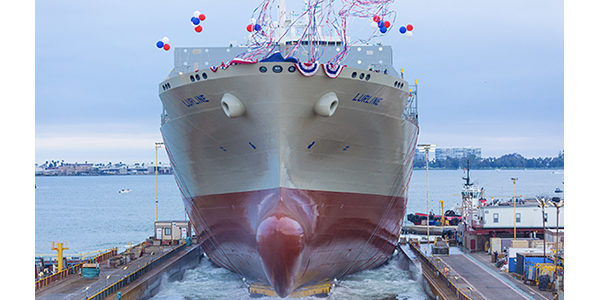Matson welcomes largest "con-ro" ship

Pacific regional marine carrier Matson, Inc. christened its largest vessel, a combination container/roll-on, roll-off (con-ro) ship, at a ceremony June 15 in San Diego, the company said this week.
Lurline is the first of two 'Kanaloa Class' ships being built for Honolulu-based Matson by General Dynamics NASSCO at a cost of about $500 million, according to Matson. It's also the third of four new vessels Matson will put into service between 2018 and 2020, the company said.
Lurline is in its final phase of construction in San Diego and is scheduled for delivery in late October, the company also said.
At 870 feet long, 114 feet wide, with a deep draft of 38 feet and weighing more than 50,000 metric tons, Lurline will be Matson's largest ship and the largest con-ro vessel ever constructed in the United States, Matson officials said. It will also be one of the company's fastest vessels, with a top speed of 23 knots.
Both Kanaloa Class vessels will include an enclosed garage with room for roughly 500 vehicles, along with space for rolling stock and breakbulk cargo. They are also environmentally friendly, according to the company, featuring a fuel-efficient hull design, environmentally safe double-hull fuel tanks, fresh water ballast systems, and the first emissions-reducing Tier 3 dual fuel engines to be deployed in containerships serving West Coast ports, officials said.
"The great speed, capacity, and environmental improvements of this new ship position us well to serve the needs of our communities in Hawaii for many years to come," Matt Cox, Matson's chairman and chief executive officer, said in a statement following the San Diego ceremony.
Related Articles
Related Events
Copyright ©2024. All Rights ReservedDesign, CMS, Hosting & Web Development :: ePublishing